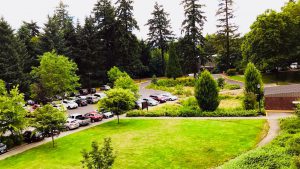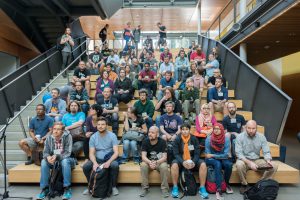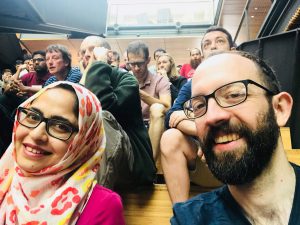How should I start describing the fruitful experience in this amazing city… First time ever in Portland, second time attending BOSC… I knew I was signing up for a great time but did not know much about the uncanny beauty of this picturesque city.
First of all, I would like to thank the Open Bioinformatics Foundation (OBF) for providing partial funding to support my travel expenses (though an OBF Travel Fellowship award). I would also like to thank my PhD supervisors Andrew Lonie and Richard O. Sinnott for the remaining expenditure.
I had written a very detailed blog post of my experience in BOSC 2017. The experience was a bit different this time as BOSC was organised in conjunction with Galaxy Community Conference(GCC) this year, unlike previous all times when BOSC was held with ISMB. On a lighter note, the most positive difference (as compared to last year) was the unlimited supply of coffee/tea in the coffee town throughout the conference to keep the morale high. The other difference was the budget-friendly registration costs of the conference this year. The cheaper accommodation options were available in the hostels of Reed College, the beautiful and lush green venue for the conference.

The conference was divided into three cores:
- Training days: The first two days June 25th and June 26th were focused on training sessions running in parallel covering various bioinformatics topics such as Galaxy introduction, RNA-seq data analysis (Galaxy and bcbio), Data carpentry workshop, Conda-Containers, Workflow Definition Language( WDL) and Common Workflow Language (CWL) introduction.
- Conference days: The next two days June 27th and June 28th were dedicated to parallel sessions of Galaxy and BOSC talks taking place in two different venues with combined keynote speeches.
- Core Cofest days: Unlike last year, the intense collaborative hacking sessions were after the conference on June 29th and 30th.
- Encore Cofest days: July 1st and 2nd also part of cofest but on a smaller scale with fewer participants.
This year was special in one more aspect that I contributed in the reviewing process as part of the BOSC program committee.
https://twitter.com/farahzk03/status/1011658076900823040
I have attended all 8 days of the conference beginning from the training all the way to end of the Encore cofest. My abstract was accepted for a long talk (and by default for a poster) in BOSC so there was a bit of anxiety until I was done with my presentation on June 28th :). There were so many interesting parallel training sessions and it was quite a tough decision to choose which one to attend. I managed to attend few such as Conda and Containers, Common Workflow Language and Snakemake and Nextflow. During the CWL training session on June 26th, I volunteered to help with the session to answer questions during the training.
https://twitter.com/rvmngr/status/1011701337719857152
Like last year, I decided to print my poster at the venue to save myself from the hassle of carrying it from one continent to the other. Keeping that in mind, I did the same this year. I got the poster printed from a local printing press Minuteman Press. The staff was highly professional, talking over the phone, placing the order over the phone, sending poster via email and paying online saved me from having to visit the shop twice. They checked the poster, called again clarified few things to make sure things are appearing the way they should be. I would say overall the experience was pretty smooth and the print quality was also up to the mark. There were in total two poster sessions, each in the evening of the conference days. My poster was scheduled for the evening session on June 27th. I received the printed copy on the morning of 27th which I arranged on the assigned slot.
https://twitter.com/farahzk03/status/1012073266599489537
The conference on June 27th started with very informative and interesting keynote speech by Fernando Perez on “Sustainable development of scientific open source tools: a view from Jupyter”.
https://twitter.com/farahzk03/status/1012002955053027328
I must admit I was not aware of the functionality of Jupyter notebooks before this and how interactive these are supporting many scripting languages as including Python, R, Julia, and Scala. Fernando was of the view that computational hygiene should be a day to day practice.
https://twitter.com/farahzk03/status/1012013507942891522
Followed by keynote was an interesting talk where four engineers collaborating remotely for the project “FROG”, shared their experiences with the packaging technologies. One of the many lessons emphasized in the talk is " The first step to learn packaging technologies: read the manuals."
https://twitter.com/farahzk03/status/1012019611741577216
An interesting talk in the evening session was given by Ravi K. Madduri on “Reproducible big data science: A case study in continuous FAIRness in which he explained how they demonstrated reproducibility of real-life workflows using Galaxy, minids and BDBags to achieve interoperability in naming and identifier conventions. He emphasized that reproducibility requires patience and discipline but “Reproducibility is like brushing your teeth. Once you learnt it, it becomes a habit .”
https://twitter.com/farahzk03/status/1012079639890546688
Some other talks in this session were Intermine 2.0 by Yo Yohudi, NIH Data Commons Introduction by David Siedzik and Snakemake by Johannas Koster. I rushed from Vollum hall where BOSC talks were organized for the Poster presentation In Performing Arts Building. The poster session was very interactive and the audience enjoyed the tea/coffee walking around and asking the presenters about their work. I think the time went by very fast and we had to rush back for the Panel discussion in Vollum hall which I missed a bit because of the ongoing conversations at the poster venue,

As I arrived late so could attend half of the panel discussion. The panel discussion was on a topic which is of my personal interest as I am working on Provenance of the Bioinformatic workflows. The topic of the discussion was “Training and Documentation in Bioinformatics” where Fernando Perez, Tracy K. Teal, Jason Williams and Berenice Batut were guests.
https://twitter.com/farahzk03/status/1012127092421455872
Also, GigaScience has the coolest Game of Thrones-themed shirts as always :D I got my hands on one last year but this year I could not get one :(.
https://twitter.com/farahzk03/status/1012175720682905605
After the panel discussion, now the time was to prepare for my talk the next morning. I was very anxious but also excited to present what I am passionate about. Michael R. Crusoe was patient to listen to me, very kind to help me with the preparation of the presentation and encouraging that it will all be good. I don’t have a massive public speaking fear but the start is always the hardest.
The highlight of June 28th for me was the presentation which was scheduled for the morning session at 11:40 am. It turned out to be better than I expected :). A huge sigh of relief and then I could really enjoy the rest of the talks without thinking about mine.
https://twitter.com/biocrusoe/status/1012394197121261568
My talk was about CWLProv, a format for the representation and automatic aggregation of workflow enactment, its results and provenance to promote interoperability and reproducibility of methods. The feedback from the live audience during and after the presentation and on twitter was very helpful and encouraging, one of the most outstanding characteristics of the BOSC community :).
https://twitter.com/yoyehudi/status/1012401483776577537
https://twitter.com/farahzk03/status/1012479030979747841
The day got better with many interesting talks such as celebrating that CWL, a project that was founded in 2014 during the discussions in BOSC2014 turned four years old :). It is exciting to see how much the standard has grown and influenced projects all around the globe with more than 20 participating organizations and many individual contributors. CWL is an epitome of “Open Source-ness” and Community-driven projects designed with continuous interaction with the community itself to build a standard for workflow definition which promotes interoperability, portability and reproducibility and resolves the heterogeneity issue in workflow domain.
https://twitter.com/yoyehudi/status/1012395134665703424
Another highlight is the provision of affordable daycare for the participants and encouraging participants from all backgrounds to participate. An example was Cristel Thomas presenting in Galaxy session with the youngest participant with her. That’s the example, this amazing event is set for the other conferences. Encouraging participation if you are eager, no matter what the circumstances are.
https://twitter.com/crstlthms/status/1012054388347555840
The day ended with an open door BBQ conference dinner, the weather, the food, the mood everything was on point. The beauty of the lush green campus and artistic architecture is breathtaking, sad that I was not able to explore much beauty but whatever I saw and wherever I went was telling a story.
https://twitter.com/farahzk03/status/1012528947836276736
A big improvement during Cofest was gender balance which was a bit alarming last year during code fest where only 3 female participants joined in total out of >60 participants. This year the situation improved drastically because of the two communities doing it together. The venue was quite spacious and full of resources to accommodate more than 100 participants working on different projects.

Like always the regular updates from groups were spread throughout the day, in the morning, before lunch and at the end of the day. These update sessions keep you going and motivate you to push yourself for tangible outputs. I worked alongside Michael (CWL) and we refactored the implementation of CWLProv, improved the prototype implementation working continuously for four days of cofest.

I believe in collaborative science without caring about geographical scenarios but with a huge time difference, it does get tricky sometimes to work together on a project. These four days were breath of fresh air discussing long due issues face to face, getting instant help, contributing more efficiently and getting a Pull Request with 338 commits merged into cwltool :). That is the biggest highlight for my participation and I am sure it would have taken much longer if I did not have this opportunity. I encourage everyone to participate in the code fest as it will increase your productivity 10x.
https://twitter.com/farahzk03/status/1016537277160275974
P.S. Some other day, I will write about my experience with food, walks around the city, strolling on the river bank and the non-science talks.